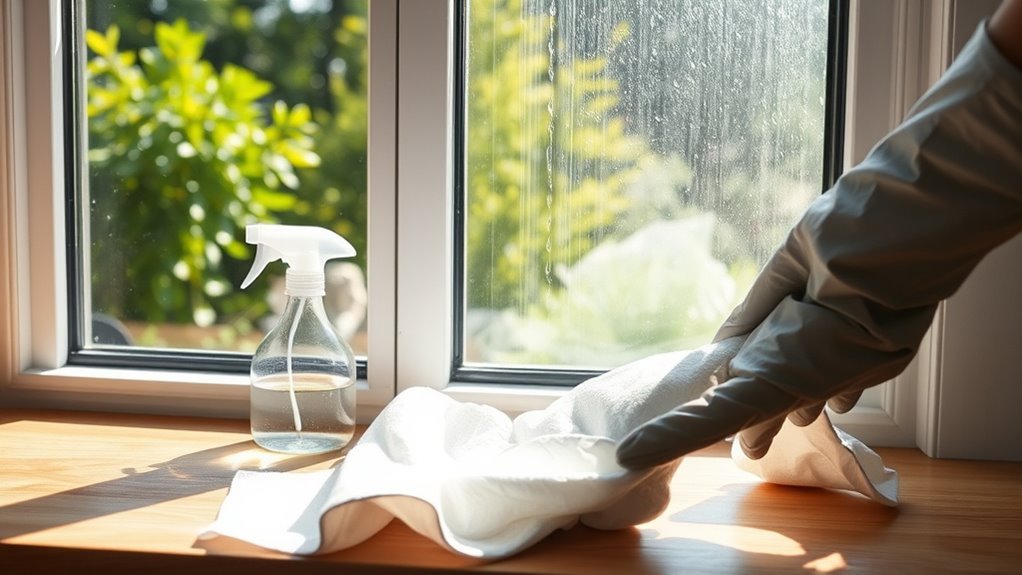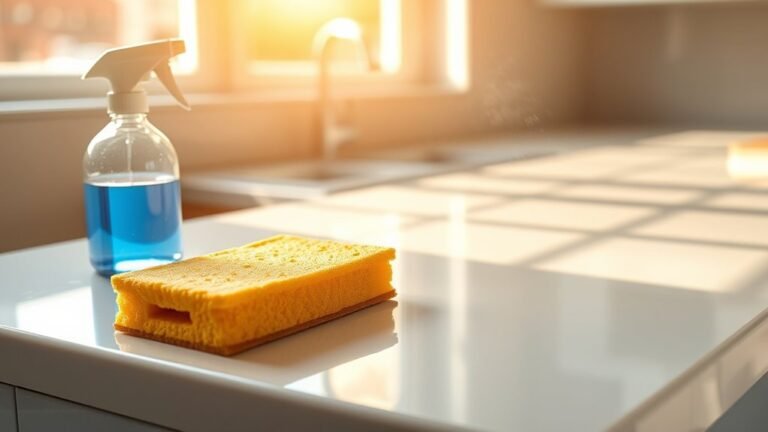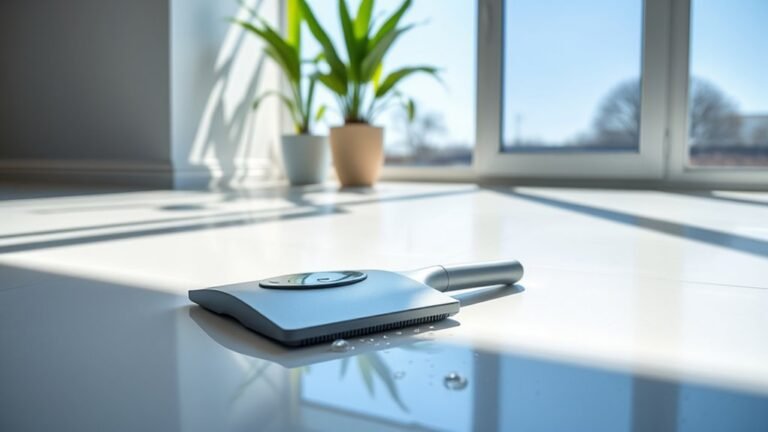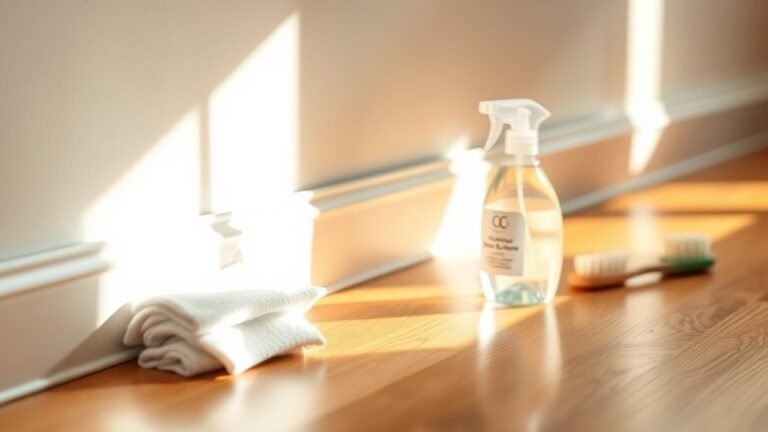Mistakes to Avoid When Cleaning Your Glass
When cleaning your glass, avoid using harsh cleaners like ammonia and skip paper towels—they can cause scratches and streaks. Always dust first to prevent grime buildup and never clean glass in direct sunlight to avoid rapid drying streaks. Don’t overapply cleaning solution, and be gentle when scrubbing. Proper drying with a microfiber cloth is key, along with regular maintenance to keep your glass clear. Keep these tips in mind to discover even more ways to perfect your glass care.
Using the Wrong Cleaning Products
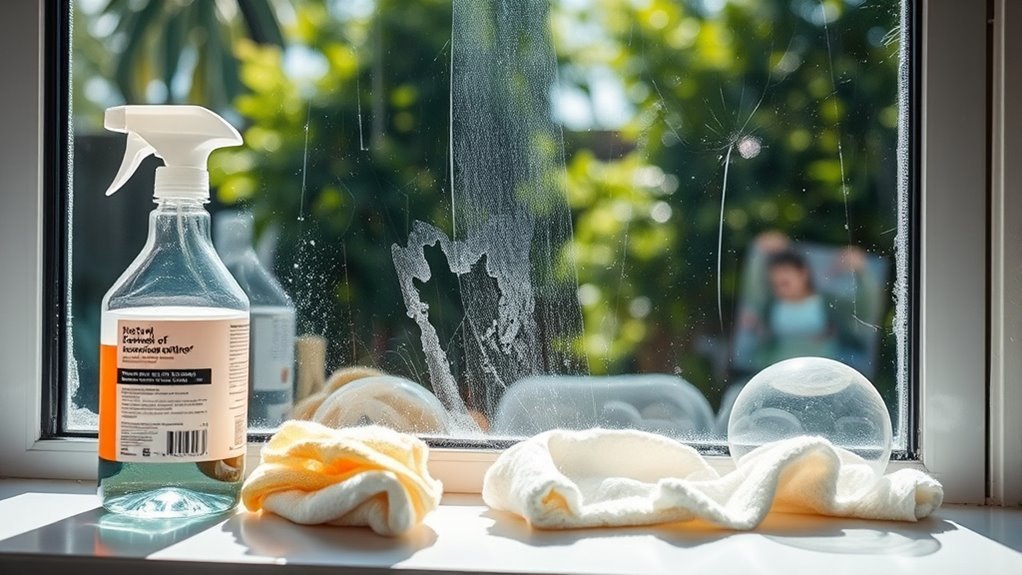
Although it might seem easier to grab whatever cleaner you have on hand, using the wrong cleaning products can damage your glass surfaces. You want to avoid unexpected chemical reactions that might etch or cloud your glass. Not all cleaners are created equal, and some ingredients simply aren’t compatible with delicate glass materials. By choosing products designed specifically for glass, you protect your surfaces and maintain their clarity. You don’t have to feel trapped by complicated labels—just check for product compatibility and avoid harsh chemicals like ammonia or bleach. When you pick the right cleaner, you’re freeing yourself from the frustration of streaks or damage and making your glass sparkle effortlessly. It’s about working smarter, not harder, to keep your glass flawless.
Neglecting to Dust Before Cleaning
You might be tempted to skip dusting before cleaning your glass, but that can actually make things worse. Dust left on the surface can turn into grime when mixed with your cleaning solution, leading to streaks and scratches. Taking a moment to remove dust first guarantees a clearer, smoother finish every time.
Importance of Dust Removal
Before you start cleaning glass surfaces, it is crucial to remove dust first. Dust accumulation not only dulls the shine but can cause scratches when wiped away carelessly. You want your glass to sparkle, not suffer damage. Using proper dust removal techniques like a microfiber cloth or a soft duster helps lift away particles safely. Avoid pushing dust around or trapping it with rough materials. By tackling dust upfront, you set the stage for a flawless clean. This simple step frees you from streaks and stubborn spots, making your cleaning effort more effective and less time-consuming. Don’t underestimate dust removal—it’s your first move toward truly clear, gleaming glass that lets your space breathe.
Effects of Skipping Dusting
If you skip dusting before cleaning, you’ll likely spread particles across the glass, creating streaks and smudges that are tough to remove. Neglecting dusting means dust accumulation effects worsen, reducing the visual clarity impact you want from clean glass. This leads to frustration and extra work, limiting your freedom to enjoy spotless surfaces effortlessly.
| Issue | Result |
|---|---|
| Dust particles | Streaks and smudges |
| Dirt buildup | Harder to clean later |
| Visual clarity loss | Reduced transparency |
| Time wasted | More frequent cleaning needed |
| Surface damage risk | Scratches from trapped debris |
Dusting first keeps glass pristine, saves time, and preserves that fresh, clear look you deserve. Don’t let dust hold you back.
Cleaning Glass in Direct Sunlight
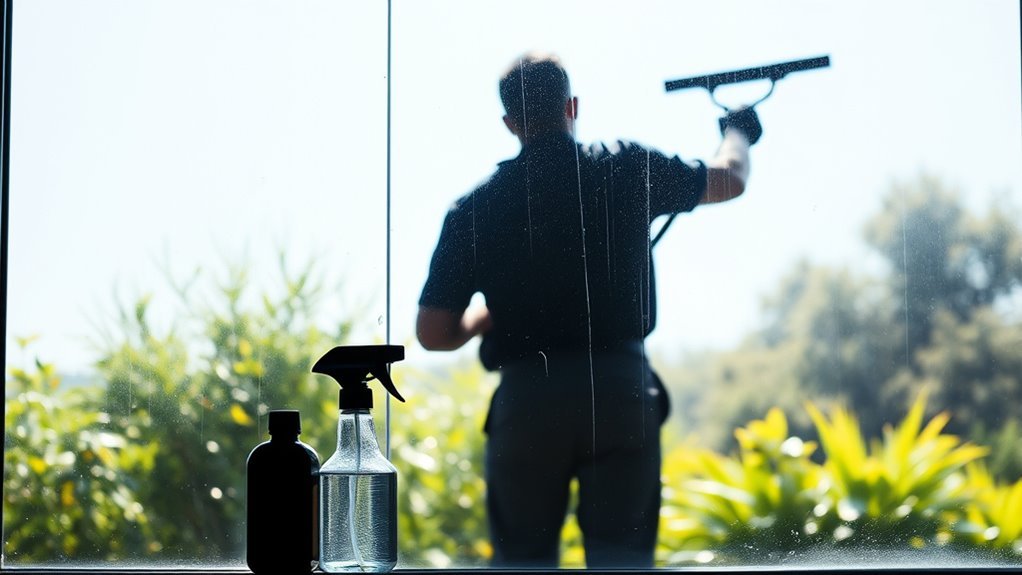
Although it might seem convenient, cleaning glass in direct sunlight can actually cause streaks and spots to form quickly. The sunlight glare heats the glass unevenly, leading to temperature fluctuations that make your cleaning solution dry too fast. This rush prevents you from wiping away grime effectively, leaving behind unsightly marks.
To clean glass like a pro, avoid these mistakes:
- Don’t clean during peak sunlight hours; opt for early morning or late afternoon.
- Use a shaded area to prevent rapid drying caused by heat.
- Avoid harsh cleaning sprays that react poorly under sunlight glare.
- Always wipe in smooth, consistent motions to reduce streaks.
Using Paper Towels Instead of Microfiber Cloths
You might think paper towels are a quick fix for cleaning glass, but they often leave behind lint and streaks that ruin the shine. Plus, their rough texture can cause tiny scratches over time. Switching to microfiber cloths helps you avoid these problems and get a clearer, streak-free finish.
Lint and Residue Issues
Many people reach for paper towels when cleaning glass, not realizing they often leave behind lint and streaks that microfiber cloths easily avoid. If you want to keep your glass crystal clear, mastering lint removal techniques and residue prevention tips is key. Here’s how to free your glass from unwanted marks:
- Switch to microfiber cloths—they trap lint and absorb residue without leaving fibers behind.
- Wash microfiber cloths regularly to maintain their effectiveness.
- Avoid fabric softeners when washing, as they can leave residues on your cloths.
- Use a gentle, residue-free cleaning solution to prevent streaks and buildup.
Potential for Scratches
Beyond lint and residue, using the wrong cleaning materials can actually damage your glass. When you grab a paper towel instead of a microfiber cloth, you risk tiny scratches that compromise clarity and longevity. Paper towels are rough and can contain fibers or debris that act like sandpaper against your glass surface. For true scratch prevention, choosing the right tool is key to effective glass care. Microfiber cloths are designed to be gentle yet thorough, capturing dirt without abrasion. If you want your glass to stay pristine and free from damage, ditch the paper towels. Embrace microfiber for a smooth, scratch-free finish. Your freedom to enjoy crystal-clear glass depends on smart choices like this in your cleaning routine.
Ineffective Streak Removal
Although paper towels might seem convenient, they often leave behind streaks that obscure your glass rather than clean it. If you want crystal-clear windows and mirrors, switching to microfiber cloths is key. These cloths trap dirt without smearing it around, making streak free techniques easier to achieve. Plus, microfiber is gentle, reducing the risk of scratches.
To maximize your cleaning freedom and maintain clarity, follow these tips:
- Use a clean, dry microfiber cloth for wiping.
- Avoid excessive cleaning frequency—over-cleaning can cause buildup.
- Lightly dampen the cloth with a proper glass cleaner for tough spots.
- Wipe in circular or vertical motions to prevent streaks.
Applying Too Much Cleaning Solution
One common mistake when cleaning glass is using too much cleaning solution. Over-applying can leave cleaner residue, which not only dulls the shine but also attracts dust and dirt faster. You want to enjoy crystal-clear glass without unnecessary buildup, so it’s essential to master the best application. Instead of soaking the surface, spray a light mist or apply a small amount to your cloth. This guarantees the cleaner works effectively without wasting product or creating streaks. Remember, less is more when it comes to cleaning solutions. By controlling the amount, you’ll keep your glass spotless and save yourself the hassle of extra wiping. Freedom means doing things right the first time—with a clean, clear view every time.
Ignoring the Frame and Edges
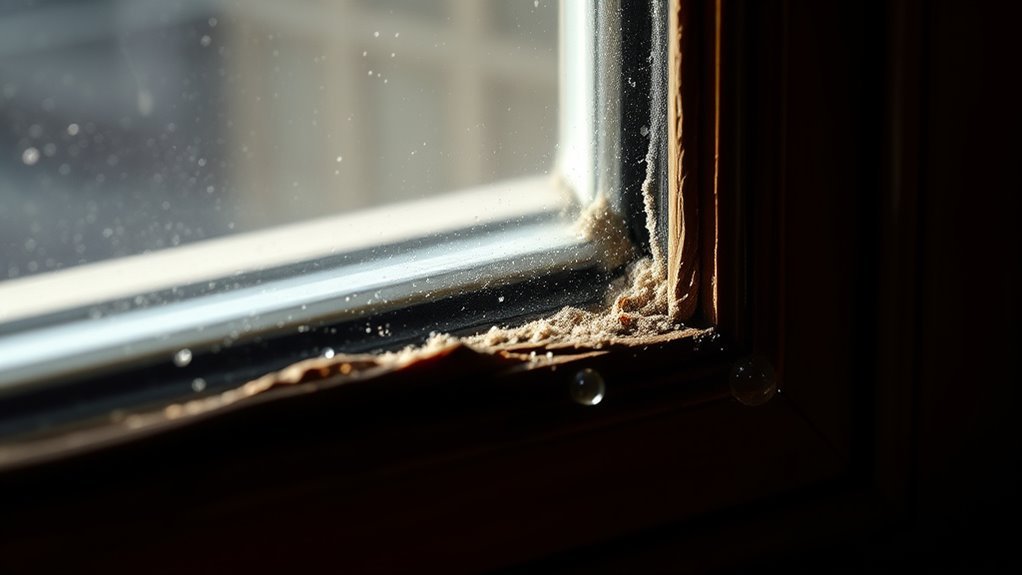
Don’t overlook the frame and edges when cleaning glass—you’ll miss dirt and grime that can build up there over time. Effective frame cleaning and edge maintenance guarantee your glass looks truly spotless and lasts longer. Here’s how you can stay on top of it:
- Wipe down frames with a damp cloth regularly to prevent buildup.
- Use a soft brush to reach dirt trapped in corners and edges.
- Avoid harsh chemicals that can damage frame materials during edge maintenance.
- Inspect seals and edges for damage or mold, addressing issues promptly.
Scrubbing Too Hard or Using Abrasive Tools
Using abrasive tools or scrubbing too hard can easily scratch and damage your glass surfaces. You want your glass to shine, not suffer from scratches or dull spots caused by harsh scrubbing techniques. Avoid abrasive cleaners and rough pads—they might seem effective, but they wear down the glass over time. Instead, opt for soft cloths or sponges that gently lift dirt without harming the surface. Remember, freedom in cleaning means working smart, not hard. By mastering gentle scrubbing techniques, you preserve the clarity and integrity of your glass, ensuring it stays flawless longer. So, skip the temptation to scrub aggressively; your glass will thank you with a streak-free, clear finish every time.
Not Drying the Glass Properly
After gently cleaning your glass, the job isn’t done until you dry it properly. Skipping this step or using improper drying techniques can leave stubborn water spots, cloudiness, and streaks that take away the freedom of clear views. To keep your glass pristine and spotless, follow these simple tips:
- Use a clean, lint-free microfiber cloth for drying—paper towels can leave fibers behind.
- Dry in a circular motion to avoid streaks and fully remove moisture.
- Avoid air drying; it’s a quick invite for water spots that spoil your hard work.
- For large glass surfaces, consider a squeegee to swiftly remove water and prevent spotting.
Mastering proper drying is key to water spot prevention and enjoying your crystal-clear glass without limits.
Overlooking Regular Maintenance
One of the biggest mistakes you can make is neglecting regular maintenance for your glass surfaces. When you skip regular upkeep, dirt and grime build up, making cleaning tougher and risking permanent damage. To truly enjoy clear, spotless glass without hassle, stick to a maintenance schedule that fits your lifestyle. This way, you avoid stubborn stains and scratches that limit your freedom to see the world clearly. Think of regular upkeep as a simple habit that keeps your glass pristine effortlessly. Don’t wait until the dirt piles up—stay ahead by scheduling consistent cleanings. With this approach, you maintain both the beauty and longevity of your glass, freeing yourself from the frustration of tough, time-consuming clean-ups down the line.
Frequently Asked Questions
Can Vinegar Damage Tinted or Coated Glass Surfaces?
You might wonder about vinegar effects on tinted glass, and it’s smart to be cautious. Vinegar’s acidity can damage the tint or coatings by breaking down the film, causing discoloration or peeling over time. If you want to keep your tinted or coated glass looking great, it’s best to avoid vinegar-based cleaners. Instead, choose gentle, pH-neutral solutions that won’t compromise your glass’s freedom to shine without harm.
How Often Should I Deep Clean My Glass Windows Annually?
Think of your glass windows as clear portals to the world, needing seasonal cleaning to keep their sparkle alive. You should deep clean them at least twice a year—once in spring to shake off winter’s grime, and again in fall to prepare for the cold months. This window maintenance routine lets you enjoy unobstructed views, giving you the freedom to bask in natural light and embrace the changing seasons with clarity.
Is It Safe to Use Glass Cleaner on Smartphone Screens?
You might wonder if it’s safe to use glass cleaner on your smartphone screen. For smartphone care, it’s best to avoid harsh glass cleaners—they can damage the screen’s protective coating. Instead, use a microfiber cloth slightly dampened with water or a screen-safe cleaner designed specifically for electronics. This keeps your screen protection intact while giving you the freedom to clean confidently without risking scratches or damage.
What’S the Best Way to Remove Hard Water Stains From Glass?
Think of hard water stains as stubborn shadows refusing to leave your glass’s bright freedom. For effective stain removal, mix equal parts white vinegar and water in a spray bottle. Spray the solution onto the glass and let it sit for a few minutes to break down mineral buildup. Then, gently scrub with a soft cloth or sponge. Rinse with clean water and dry thoroughly—this frees your glass from stains, restoring its clear, open view.
Can Cleaning Glass Improve Energy Efficiency in My Home?
Absolutely, cleaning your glass regularly can boost energy savings by letting more natural light into your home, reducing the need for artificial lighting. When you maintain a consistent cleaning frequency, grime and dirt won’t block sunlight, helping your space stay warmer in winter and cooler in summer. This simple habit not only enhances your view but also supports your freedom to enjoy energy-efficient living without extra costs or complications.
